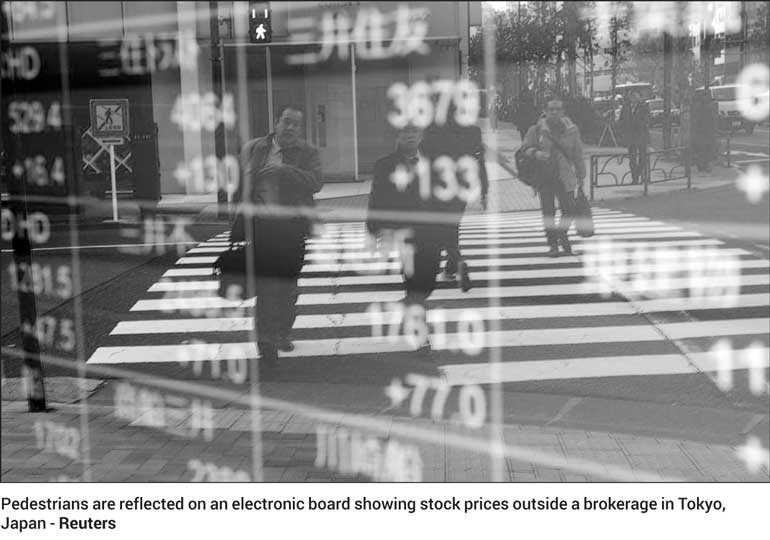Saturday Feb 21, 2026
Saturday Feb 21, 2026
Saturday, 29 December 2018 00:00 - - {{hitsCtrl.values.hits}}

TOKYO (Reuters): Asia stocks advanced on Friday after Wall Street ended volatile trade in positive territory, adding to the previous session’s big gains, although lingering investor jitters helped support safe-haven currencies such as the yen.
MSCI’s broadest index of Asia-Pacific shares outside Japan rose 0.8%. It has fallen 3% so far in December.
The Shanghai Composite Index moved up 0.35%.
Australian stocks added 1% and South Korea’s KOSPI climbed 0.5%. Japan’s Nikkei bucked the trend and slipped 0.3%, losing some steam after surging nearly 4% on Thursday.
US stocks roared back to end in positive territory on Thursday, with the Dow adding 1.14%, after suffering steep losses for much of the session.
The gains come a day after Wall Street indexes posted their biggest daily%age increases in nearly a decade following a sharp plunge at the week’s start.
However, all three US major indexes remain down more than 9% for December following losses earlier in the month, when factors including concerns over the US-China trade war, slowing global growth and wariness towards the Federal Reserve’s tightening cycle took a heavy toll.
“Selling pressure on US equities is beginning to dissipate, but the VIX index is still around 29 with investor risk sentiment still recovering. A renewed market slide remains a risk,” said Junichi Ishikawa, senior FX strategist at IG Securities in Tokyo.
The CBOE Volatility Index rose midweek to 36, its highest level since early February. It has since pulled back below 30 but remains well above a recent low of 15 at the beginning of December.
Focus turned to the Fed’s stance and whether the equity markets can sustain their recovery at the start of the new year.
“If Fed officials – notably Chairman (Jerome) Powell and New York Fed Governor Williams – show a cautious stance towards further rate hikes given recent instability in the stocks markets, that would lead to a rise in US equities and Treasury yields, and a firmer dollar,” said Masafumi Yamamoto, chief forex strategist at Mizuho Securities in Tokyo.
Fed Chairman Powell is due to give a speech on 4 January.
While stocks showed signs of recovery, lingering market volatility helped keep safe-haven currencies such as the yen and Swiss franc in demand.
The dollar extended overnight losses and was down 0.3% at 110.64 yen. It was on track to lose more than 2% this month.
The greenback declined 0.3% to 0.9851 francs per dollar after slumping more than 0.8% the previous day. The US currency has fallen 1.1% against its Swiss peer on the month.
The euro was a shade higher at $1.1450 after gaining 0.7% overnight. The common currency was headed for a 1% gain in December.
The 10-year US Treasury note yield was up 3 basis points at 2.773%, pulling back from a nine-month low of 2.720% brushed earlier in the week.
The yield had climbed to a seven-year peak of 3.26% in October when the debt market had braced for potentially faster pace of Fed rate hikes in 2019.
Oil prices remained choppy, with US crude futures up 2.2% at $45.60 per barrel after sliding 3.5% the previous day.
US crude had rallied 8% midweek after dropping to a 1-1/2-year low of $42.36 at the week’s start.
Crude has lost more than one-third of its value since the beginning of October and is heading for declines of more than 20% in 2018.
In addition to oversupply concerns, worries about slowing global economic growth have dampened investor demand for riskier asset classes and pressured crude.
Brent crude climbed 1.8% to $53.11 per barrel after losing more than 4% the previous day.
Spot gold, which has benefited this week from the global market turmoil was slightly higher at $1,278.71 an ounce following an ascent to a six-month high of $1,279.06 on Wednesday.